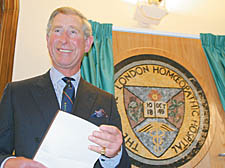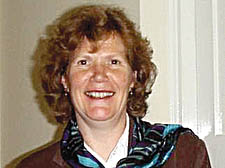|
|
 |
| |

Prince Charles opens the newly-refurbished Royal London Homeopathic Hospital in October 2005

Dr Sara Eames |
Not just a placebo effect
Complementary medicine can help where conventional treatment fails, writes Dr Sara Eames
I am a conventionally trained doctor who worked as a GP before training in homeopathy and I now practice, within the NHS, at the Royal London Homeopathic Hospital. I feel passionately about the NHS and appreciate its financial difficulties, and I feel strongly that complementary medicine can actually help with this problem rather than making it worse.
The Royal London Homeopathic Hospital in Great Ormond Street has been open to the public since 1849 and has been part of the NHS since the beginning in 1948. The hospital is staffed by conventionally-trained doctors and patients are referred by their own GPs or hospital consultants. Most of the people we see have very chronic conditions and have already had years of extremely expensive and often not particularly helpful, conventional treatment. Who will be able to help these people if this alternative is not available to them?
The argument that complementary medicine should not be publicly funded because modern drugs are very expensive and the money is best spent on the these, is not going to solve the problems of the NHS budget.
We are committed to working in an integrated way with conventional doctors in order to offer the most effective and cost effective care for patients.
There is quite a lot of evidence that using complementary medicines can actually reduce health costs, while improving quality of life. Results from the homeopathic hospitals show an improvement in the patients presenting condition and overall well-being as well as a reduction in the amount of conventional medicine required.
These positive results are often dismissed as ‘a mere placebo’ effect due to the fact that complementary practitioners have time to talk to and listen to their patients and provide therapies which are bound to make them feel better. What is the problem with that? Isn’t that what patients hope for when they consult a doctor?
Another real danger of not providing complementary therapies in a considered and integrated way within the NHS is that vulnerable patients will be more likely to be exposed to a completely unregulated system.
It is a sad fact of life that there are always people around prepared to profit from others misfortunes and by working together practitioners can really help to minimise this. The Royal London Homeopathic Hospital has a proud history of providing health care in the centre of London and many of the remedies which we use have stood the test of time, having been in use for well over 200 years. We have an active research and audit department and run the National Electronic library for complementary therapies in order to provide the best available information to patients and health professionals.
The argument of either conventional medicine or complementary medicine is really an old fashioned one. Surely we all need to work together to combine the best of different approaches for the benefit of patients and the NHS.
|
| |
|
 |
|